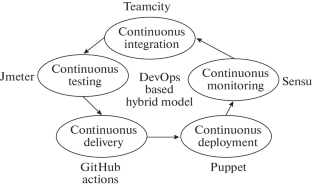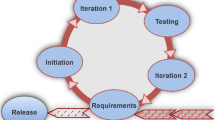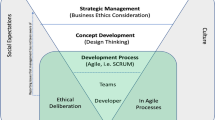Abstract
Software development strategies have progressed from classic waterfall to more recent DevOps culture. This journey through various methodologies covers many development models from waterfall, spiral, prototype and agile to the continuous phases of DevOps, that improve software quality and productivity to a much greater extent. DevOps employs different tools at each phase to automate the task of development and operations. Existence of many tools necessitates the use of a development process that incorporates a DevOps-based hybrid model of integrated automation tool chain (ITC). The goal of this research is to compare the performance of already proposed and implemented DevOps-based hybrid model to randomly selected another DevOps-based hybrid model of different tool chain. This research will help software developers and industrialists choose the finest ITCs from a plethora of alternatives that not only speed up the development process but also offer quality. For further study, proposals and implementations of another DevOps-based hybrid models for different ITCs can be designed.






Similar content being viewed by others
REFERENCES
P. Narang and P. Mittal, “Hybrid model for software development: An integral comparison of DevOps automation tools,” Indones. J. Electr. Eng. Comput. Sci. 27 (1), 456–465 (2022). https://doi.org/10.11591/ijeecs.v27.i1.pp456-465
P. Narang and P. Mittal, “Implementation of DevOps hybrid model for project management and deployment using Jenkins with plugins,” Int. J. Comput. Syst. Network Secur. 22 (8), 249–259 (2022). https://doi.org/10.22937/IJCSNS.2022.22.8.31
P. Narang and P. Mittal, “Performance assessment of traditional software development methodologies and DevOps automation culture,” Eng. Technol. Appl. Sci. Res. 12 (6), 9726–9732 (2022). https://doi.org/10.48084/etasr.5315
L. L. Beck and T. E. Perkins, “A survey of software engineering practice: Tools, methods, and results,” IEEE Trans. Software Eng. 9 (5), 541–561 (1983). https://doi.org/10.1109/tse.1983.235114
H. K. Buhrer, “Software development: what it is, what it should be, and how to get there,” ACM SIGSOFT Software Eng. Notes 28 (2) (2022). https://doi.org/10.1145/638750.638777
I. Jacobson and E. Seidewitz, “A new software engineering,” Commun. ACM 57 (12), 49–54 (2014). https://doi.org/10.1145/2677034
P. Narang, P. Mittal, P. Gulia, and Balkrishan, “Insights into DevOps automation tools employed at different stages of software development”, in Computational Intelligence in Software Modeling, Ed. by V. Jain, J. M. Chatterjee, A. Bansal, U. Kose, and A. Jain (De Gruyter, Berlin, 2022), pp. 93–106. https://doi.org/10.1515/9783110709247-007
H. Edison, X. Wang., and K. Conboy, “Comparing methods for large-scale agile software development: A systematic literature review,” IEEE Trans. Software Eng. 48 (8), 2709–2731 (2021). https://doi.org/10.1109/TSE.2021.3069039
P. Narang and P. Mittal, “Software development methodologies: Trending from traditional to DOSE—An empirical study,” in Proc of IEEE Delhi Section of International Conference on Electrical, Electronics and Computer Engineering (DELCON-2022). https://ieeexplore.ieee.org/document/9753613.
L. Traini, “Exploring performance assurance practices and challenges in Agile software development: An ethnographic study,” Empirical Software Eng. 27, 74 (2022). https://doi.org/10.1007/s10664-021-10069-3
E. Soares, G. Sizilio, J. Santos, D. Alencar da Costa, and U. Kulesza, “The effects of continuous integration on software development: A systematic literature review,” Empirical Software Eng. 27 (28) (2022). https://doi.org/10.1007/s10664-021-10114-1
P. Narang and P. Mittal, “DevOps: Bringing efficiency in delivering software product: A review,” in Proceedings of National Conference on Future Innovations in Computing Technologies and Machine Learning (FICTML-17) (Maharshi Dayanand University, Rohtak (Haryana), 2017).
D. Atesogullari and A. Mishra, “Automation testing tools: A comparative view,” Int. J. Inf. Technol. Secur. 4 (12) (2020).
E. Pelivani, A. Besimi, and B. Cico, “An empirical study of user interface testing tools,” Int. J. Inf. Technol. Secur. 1 (14) (2022).
D. E. Rzig, F. Hassan, and M. Kessentini, “An empirical study on ML DevOps adoption trends, efforts, and benefits analysis,” Inf. Software Technol. 152, 107037 (2022). https://doi.org/10.1016/j.infsof.2022.107037
W. W. Royce, Managing the development of large software systems. https://en.wikipedia.org/wiki/Winston_W._Royce. Accessed September 14, 2022.
G. Papadopoulos, “Moving from traditional to agile software development methodologies also on large, distributed projects,” Elsevier Procedia: Soc. Behav. Sci. 175, 455–463 (2015). https://doi.org/10.1016/j.sbspro.2015.01.1223
O. Uludag, A. Putta, M. Paassivaara, and F. Matthes, “Evolution of the agile scaling frameworks,” in International Conference on Agile Software Development: XP 2021 (Agile Processes in Software Engineering and Extreme Programming), (Springer, Cham, 2021), pp. 123–139. https://doi.org/10.1007/978-3-030-78098-2_8.
T. Dingsoyr, N. B. Moe, T. E. Faegri, and E. A. Seim, “Exploring software development at the very large-scale: A revelatory case study and research agenda for agile method adaptation,” Empirical Software Eng. 23, 490– 520 (2018).
A. Agrawal, M. A. Atiq, and L. S. Maurya, “A current study on the limitation of agile methods in industry using secure Google forms,” Elsevier Procedia Comput. Sci. 78, 291–297 (2016). https://doi.org/10.1016/j.procs.2016.02.056
M. Gomes, R. Pereira, M. Silva, J. Braga de Vasconcelos, and À. Rocha, “KPIs for evaluation of DevOps teams,” in World Conference on Information Systems and Technologies (Springer, Cham, 2022), pp. 142–156. https://doi.org/10.1007/978-3-031-04829-6_13.
A. Mishra and Z. Otaiwi, “DevOps and software quality: A systematic mapping,” Elsevier Comput. Sci. Rev. 38, 100308 (2020). https://doi.org/10.1016/j.cosrev.2020.100308
P. Debois, “Agile infrastructure and operations: How infra-gile are you?,” in Proceedings of the Agile 2008 Conference (IEEE, Toronto, 2008). https://doi.org/10.1109/Agile.2008.42.
A. A. Khan and M. Shameem, “Multicriteria decision-making taxonomy for DevOps challenging factors using analytical hierarchy process,” J. Software Evol. Process 32 (10), 11–13 (2020). https://doi.org/e2263.10.1002/smr.2263.
L. Leite, C. Rocha, F. Kon, D. Milojicic, and P. Meirelles, “A survey of DevOps concepts and challenges,” ACM Comput. Surv. 52 (6), 1–35 (2019). https://doi.org/10.1145/3359981
D. Trihinas, A. Tryfonos, M. D. Dikaiakos, and G. Pallis, “DevOps as a service: Pushing the boundaries of microservice adoption,” IEEE Internet Comput. 22 (3), 65–71 (2018).
Funding
The authors accepts no receiving of funding.
Author information
Authors and Affiliations
Corresponding author
Ethics declarations
The authors declare that they have no conflicts of interest.
Additional information
Publisher’s Note.
Pleiades Publishing remains neutral with regard to jurisdictional claims in published maps and institutional affiliations.
Rights and permissions
About this article
Cite this article
Narang, P., Mittal, P. Continuous Assessment and Improvement of Software Quality with DevOps-Based Hybrid Model of Automation Tools. J. Comput. Syst. Sci. Int. 62, 412–419 (2023). https://doi.org/10.1134/S1064230723020144
Received:
Revised:
Accepted:
Published:
Issue Date:
DOI: https://doi.org/10.1134/S1064230723020144




